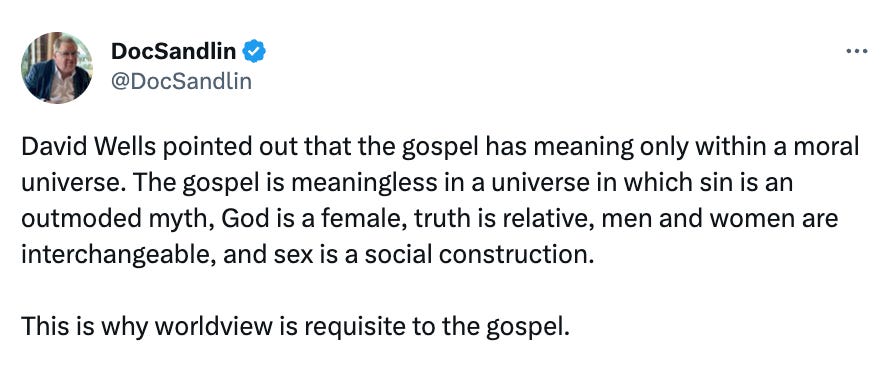Against “Higher” Spirituality
Every call to “higher” spirituality, no matter how well-intentioned, is a call to irresponsibility in God’s world. It is a strategy of escape, not engagement.
Dear friends and supporters:
Throughout church history elitist movements have emerged to transcend ordinary daily Christian life and to offer a promise of a “higher” (or “deeper”) spirituality drawing the transcendent soul closer to God than the common herd can experience. In modern evangelicalism, the most prominent instance was the Keswick (England) Movement[1] of the early 20th century (whose roots were in the 19th), fueled by annual “Deeper (or Higher) Life Conferences” whose influence fanned out to the evangelical world. The Roman Catholic version of the Higher Life began much earlier, not only with the monastic life but with the more pervasive “sacred heart of Jesus.”[2]
Though well-intentioned, these movements severely misinterpreted normative Christianity,[3] whose chief arena, according to the Bible, is not a spiritual life floating above and oblivious to the mundane, but precisely within the wear and tear of ordinary daily life. Man was created to live before God in this world, not above and beyond it, or with only a tangential attachment to it.
“Higher” spirituality isn’t more spiritual at all. Rather, it’s a debasement of man’s primal calling before God to steward the earth for his glory (Gen. 1:26–28). Unfortunately, it appears under a number of iterations in the church.
Holiness as a Special Vocation
For example: The “Higher” Spiritualists create a bifurcation between higher and lower spirituality. Just as the ancient Roman Church developed the monastic life to isolate monks and nuns for a life “wholly given to God” and thereby distinguish them from ordinary Christians tasked with living within the “lower” spiritual realm of the world common to believer and unbeliever, so the modern evangelical church invented a bifurcated spirituality by which the devoted Christians avoided as much as possible intense interest in mundane work-for-wages, time spent with family and friends, and recreational pursuits such as sports or exercise or nature-watching.
Instead, the genuine Christian life consists of fervent Bible-reading and prayer and fasting and reading devotional manuals and attending church and its myriad of special meetings, especially evangelistic outreaches. Don’t be mistaken: some of these tasks are vital to Christian health, but they are not of a greater order of spiritual magnitude than relishing God’s good creation, spending time with and encouraging family and friends, and providing financially for one’s family. To participate in these for God’s glory is just as holy as Bible-reading and church attendance (see 1 Cor. 10:31–33).
To claim to love God but care little for our brother of sister is utter incongruity (1 Jn. 4:20). If a man refuses to provide financially for his family (even under the excuse of devoting himself to the Lord), he is worse than an infidel and has denied the Faith (1 Jn. 5:8). We don’t honor God by dishonoring ordinary life. Martyn Lloyd-Jones once called this creation of a class of a higher spirituality “holiness as a special vocation.” But holiness is not a special vocation — it’s a 24/7 way of life.
Spiritual Versus Physical
Then there’s the problem of subordinating the physical to the spiritual. This move borrows from the ancient Gnostic heresy (see “The Serpent’s Gnostic Hiss”). Gnosticism, the first Christian heresy, posited that an inferior god created matter in ignorance of the true God’s desires, and that the God-honoring life is one of the disembodied soul’s escape from the material world at death.
While the Bible teaches than the world’s great problem is sin, the Gnostics taught that it is matter. Today’s spiritual-over-physical Christians aren’t full-bore Gnostics, but their constant denigration of the material, including the human body, reeks of the smoke from Gnostic fires. They seem not to grasp that in the Bible, “spiritual” doesn’t mean non-physical, but governed by the Spirit. “Spiritual” can be both contrasted with (1 Cor. 9:11) and include, the material (1 Cor. 10:3–4).
The Christian’s physical body filled with the Spirit is spiritual. So are money and houses and cars and clothes and yachts and shotguns surrendered to Jesus Christ and used for godly purposes. All that is devoted to Jesus Christ and governed by the Spirit is spiritual, whether material or non-material. In the Bible, the great contrast is never between material and non-material, but between sin and righteousness. Jesus Christ was born and lived and died and rose and will forever exist as a human body, while the evilest being in the universe is pure spirit.
“Full-Time” Christian Service
A final modern blunder relating to spirituality in the church is the propensity to unduly elevate “full-time Christian service.” By this I mean those who derive all their income from churchly tasks like the pastorate or foreign missionary work or from Christian education. Selling cars and writing computer code and investing wealth in the stock market and owning a small business are not “full-time Christian service” and though considered necessary (“somebody, after all, has to pay the salaries of the truly spiritual ones”), they are spiritually inferior. I read a striking example of this reasoning over 20 years ago:
Another point in which church and school [Christian college] must be united is in stressing the aim of [full-time] Christian service as the highest goal of life…. [Over time] the aim has shifted to serving the Lord by being the best we could be in any chosen discipline…. Satan has used that strategy in our age. The focus on Christian service has declined in favor of majors in every secular [ = non-full-time Christian service] discipline. Our churches and schools must maintain the theme of [full-time] service, service, service.[4]
The notion that pastors and missionaries and Christian school teachers occupy the highest Christian service while Christians making their living by “secular endeavors,” despite the fact that they’re doing their job to God’s glory, are inferior is a flagrant denial Christ’s Lordship in all of life. No Scripture supports this warped view of spirituality, and it has surrendered vast areas of the world to Satan and his hosts.
Christians who champion this false view often complain about the depraved state of the world, yet their own “full-time-Christian-service” spirituality contributes to that depravity by siphoning many devout Christians away from the callings in which God has naturally gifted them (like electrical engineering, medical product sales, and professional sports) and guilting them into churchly fields for which they’re not gifted. Every area of creation is to be brought under the authority of Christ the King, and to position “full-time Christian service” as a higher spiritual calling is to truncate the Christian’s comprehensive mandate in the earth.
Conclusion
Man is never called to be more spiritual than God intends. Or rather, God alone defines what spirituality is. Every call to “higher” spirituality, no matter how well-intentioned, is a call to irresponsibility in God’s world. It is a strategy of escape, not engagement. But man is God’s deputy in creation, and he is never called to escape it, but to bring out its latent goodness for its — and our — Lord’s glory.
Will you consider a tax-deductible donation to CCL via PayPal or Venmo? Or mail a check to CCL, Box 100, Coulterville, CA 95311. God uses you to keep us going — and expanding.
Personal
While I must stay home with my aged father, my wife Sharon and daughter Peace are headed off Saturday to Vancouver, BC to attend my eldest son Richard’s ordination to the Gospel ministry in ACNA, the Anglican Church of North America. This is an orthodox, Thirty-Nine-Articles confessing, biblical-sexuality-championing denomination. Our son is a faithful, gifted, kind-hearted, mighty man of God. He holds a Ph.D. in philosophy from the University of British Columbia, but he chose to turn down an academic career because he loves the church of Jesus Christ so much and wishes to devote his life there.
Please secure a paid subscription, or donate to CCL at the links above if you can. And persist in prayer.
Yours for the King,
Founder & President, Center for Cultural Leadership
Tweet of the Week
Coming Soon From CCL:
More great stuff:
The Center for Cultural Leadership site is here.
My Amazon author page (print and digital) is here.
My I-Tunes sermons, lectures and podcasts are here.
You can find my sermons and lectures at my YouTube channel.
Sign up to get my blog updates here.
Here’s my Twitter feed.
If you want to get the free exclusive hard copy publication Christian Culture, please send me a Facebook private message.
The CCL phone number is 831-420-7230.
The mailing address is:
Center for Cultural Leadership
P. O. Box 100
Coulterville, CA 95311
[1] Douglas W. Frank, Less Than Conquerors (Grand Rapids: Eerdmans, 1986), 103–166.
[2] G. L. Prestige, Fathers and Heretics (London: SPCK, 1940, 1948), 199–201.
[3] Benjamin Breckinridge Warfield, “The Higher Life Movement,” Perfectionism (Philadelphia: Presbyterian and Reformed, 1958), 216–311.
[4] John E. Ashbrook, “Expectations,” The Ohio Bible Fellowship Visitor, April 2002, 5.









I'm fully with Luther on the holiness of the milkmaid or the mom.
On the other hand, Paul's carve out for the celibate seems to be a genuine "higher" spirituality.
Perhaps the resolution lies here: anyone thinking they have a higher spirituality can only be taken seriously if they put themselves cheerfully lower than all the rest, serving them in the dirty grimy wonderfully smelly world, considering others more significant than themselves.